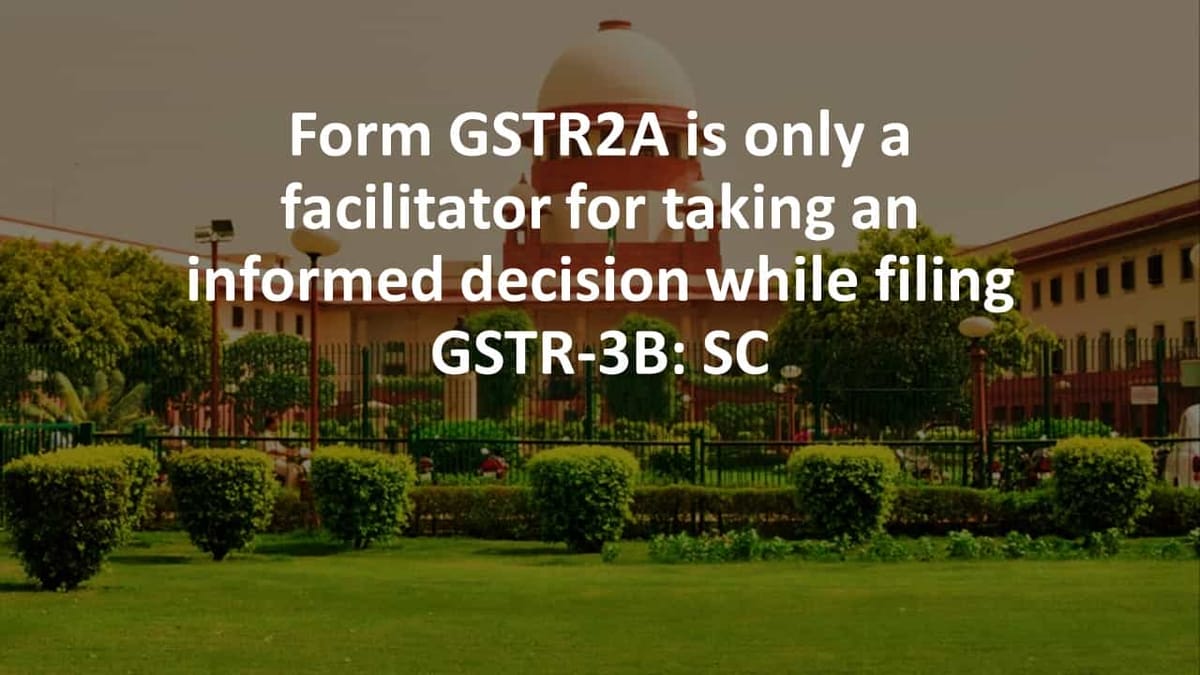Deepak Gupta | Oct 28, 2021 |

Form GSTR2A is only a facilitator for taking an informed decision while filing GSTR-3B: SC
The main argument was that due to nonoperability of Form GSTR2A at the relevant time (July to September 2017), Taxpayer has been denied of access to the information about its electronic credit ledger account and consequently, availing of ITC for the relevant period and instead to discharge the OTL by paying cash to its vendors.
Delhi High Court made the decision in favor of the Taxpayer where the court said that, if the statutorily prescribed returns, GSTR-2 and GSTR-3 had been operationalised by the Centre, the petitioner would have known the correct input tax credit amount available to it in the relevant period, and could have discharged its liability through the tax credit.
The Centre has filed a Petition against this decision and views of Supreme Court were as follows:
Relevant Text
46. We need not multiply the authorities referred to in the concerned judgments, and cited before us, as in our opinion, these decisions have not dealt with the cardinal aspect of statutory obligation fastened upon the registered person to maintain books of accounts and record within the meaning of Chapter VII of the 2017 Rules, which are primary documents and source material on the basis of which selfassessment is done by the registered person including about his eligibility and entitlement to get ITC and of OTL. Form GSTR2A is only a facilitator for taking an informed decision while doing such selfassessment. Non performance or nonoperability of Form GSTR2A or for that matter, other forms, will be of no avail because the dispensation stipulated at the relevant time obliged the registered person to submit returns on the basis of such selfassessment in Form GSTR3B manually on electronic The provision contained in Section 39(9) of the 2017 Act and Rule 61 of the Rules framed thereunder, as applicable at the relevant time, apply with full vigor to the returns filed by the registered person in Form GSTR3B.
47. Significantly, the registered person is not denied of the opportunity to rectify omission or incorrect particulars, which he could do in the return to be furnished for the month or quarter in which such omission or incorrect particulars are noticed. Thus, it is not a case of denial of availment of ITC as such. If at all, it is only a postponement of availment of ITC. The ITC amount remains intact in the electronic credit ledger, which can be availed in the subsequent returns including the next financial year. It is a different matter that despite the availability of funds in the electronic credit ledger, the registered person opts to discharge OTL by paying cash. That is a matter of option exercised by the registered person on which the tax authorities have no control, whatsoever, nor they have any role to play in that regard. Further, there is no express provision permitting swapping of entries effected in the electronic cash ledger visavis the electronic credit ledger or vice versa.
48. A priori, despite such an express mechanism provided by Section 39(9) read with Rule 61, it was not open to the High Court to proceed on the assumption that the only remedy that can enable the assessee to enjoy the benefit of the seamless utilization of the input tax credit is by way of rectification of its return submitted in Form GSTR3B for the relevant period in which the error had occurred. Any unilateral change in such return as per the present dispensation, would have cascading effect on the recipients and suppliers associated with the concerned transactions. There would be complete uncertainty and no finality could ever be attached to the selfassessment return filed electronically. We agree with the submission of the appellant that any indulgence shown contrary to the statutory mandate would not only be an illegality but in reality, would simply lead to chaotic situation and collapse of tax administration of Union, States and Union Territories. Resultantly, assessee cannot be permitted to unilaterally carry out rectification of his returns submitted electronically in Form GSTR3B, which inevitably would affect the obligations and liabilities of other stakeholders, because of the cascading effect in their electronic records.
49. As noted earlier, the matching and correction process happens on its own as per the mechanism specified in Sections 37 and 38, after which Form GSTR3 is generated for the purposes of submission of returns; and once it is submitted, any changes thereto may have cascading effect. Therefore, the law permits rectification of errors and omissions only at the initial stages of Forms GSTR1 and GSTR3, but in the specified manner. It is a different dispensation provided than the one in preGST period, which did not have the provision of autopopulated records and entries.
50. Suffice it to conclude that the challenge to the impugned Circular No. 26/26/2017GST dated 29.12.2017, is unsustainable for the reasons noted hitherto. We hold that stipulations in the stated Circular including in paragraph 4 thereof, are consistent with the provisions of the 2017 Acts and the Rules framed thereunder. Having said that, it must follow that there is no necessity of reading down paragraph 4 of the impugned Circular as has been done by the High Court vide impugned judgment. In any case, the direction issued by the High Court being in the nature of issuing writ of mandamus to allow the writ petitioner to rectify Form GSTR3B for the period July to September 2017, in the teeth of express statutory dispensation, cannot be sustained
In case of any Doubt regarding Membership you can mail us at contact@studycafe.in
Join Studycafe's WhatsApp Group or Telegram Channel for Latest Updates on Government Job, Sarkari Naukri, Private Jobs, Income Tax, GST, Companies Act, Judgements and CA, CS, ICWA, and MUCH MORE!"